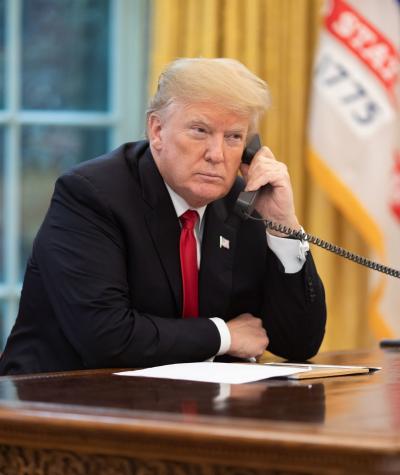President-elect Donald Trump’s transition team has submitted an ethics pledge that does not require Trump to address the potential conflicts of interest that may impact his decisions during his second term.
By doing so, Trump is skipping a key part of upholding transparency and accountability for the executive branch. Even before a new administration officially takes office, voters have a right to know if there are any conflicts of interest that could influence the behavior of an incoming president and his staff.
That is why the Presidential Transition Act requires a presidential transition team to submit an ethics pledge, well before voters select a candidate, that lays out how their administration will uphold ethics standards throughout the transition period and beyond.
Trump’s team missed the pre-Election Day deadline to submit a transition plan and ethics code, raising concerns that a possible second term would be mired in ethics conflicts like his first.
On November 27, weeks after Trump was elected, he finally presented an ethics plan that explains how the transition team will handle appearances of conflicts of interest.
But one major component cannot be found in the document: language on how these ethics requirements will apply to the president himself. These key details are noticeably missing.
Without a clear plan, the American public is left in the dark about how Trump — a wealthy businessman with a real estate empire and ties to numerous industries — will navigate the potential conflicts of interest that may arise in his second term.
Trump has several holdings that raise significant conflicts of interest concerns, including his new cryptocurrency business, majority stake in the social media network Truth Social, real estate properties, books, and licensing deals.
If the president-elect were to sign an agreement vowing to avoid conflicts of interest, it would suggest that he would divest from many — if not all — of these holdings.
A key part of Trump’s broad personal wealth is his many stock holdings that span multiple industries. The ethics plan does not outline a directive on stock ownership for the president, meaning that Trump will have direct financial interests when it comes to regulating those industries.
The ethics plan also provides very little guidance for how transition team members should handle their own stock portfolios during and immediately after the transition.
While there is a general requirement for team members to avoid actual and apparent financial conflicts of interest, there is no ban on stock trading. That could allow transition team members to use their proximity to government information to gain an advantage in the stock market.
Because transition team members are not government employees, they do not have to file the same sort of thorough financial disclosures that we see from members of Congress and current administration officials.
That means without clear and detailed prohibitions on stock trading, and without any financial disclosure, the public is totally unaware of whether transition team members are using their positions for private gain.
This is especially important when considering what roles Trump’s transition team will play in the following administration. Look no further than Linda McMahon and Howard Lutnick, billionaire transition team co-chairs and longtime Trump confidants.
Both have been tapped for leadership roles; McMahon is Trump’s designated nominee for secretary of Education, Lutnick for secretary of Commerce.
It is widely suspected that, as a part of the administration, they will have a massive amount of influence on regulations that cover their personal financial interests.
During this crucial transition period, the public cannot be sure how they are already influencing the government without a more robust ethics pledge that protects against possible conflicts.
Trump is setting the scene for a second term that looks a lot like his first — a rejection of ethics standards, a cabinet riddled with corruption and a slate of personal conflicts of interests.
Voters have a right to know whether their elected officials are focused on the needs of the public or are prioritizing their own personal wealth or the wants of special interests. Improving our democratic institutions relies on the consistent enforcement of ethics laws from election to inauguration.
Campaign Legal Center will be keeping a watchful eye on ethics under the Trump administration — keep up with us through our action page.


